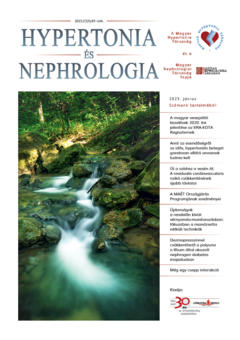The eLitMed.hu medical portal uses computer cookies for convenient operation. Detailed information can be found in the Cookie-policy.
Specialities
Cardiology
[Novelties in out-of -office blood pressure monitoring: cuffless techniques in focus]
[Hypertension guidelines recommend using the average values of static blood pressure readings (office or out-of-office), although the dynamic nature of blood pressure is well-known. At current paradigm of hypertension care the awareness and control of hypertension in the population is insufficient. Cuffless blood pressure monitoring has several theoretic adventages. These devices are capable of both intermittent, and continuous long-term blood pressure monitoring, combining the adventages of both home blood pressure monitoring (HBPM) and ambulatory blood pressure monitoring (ABPM) without disturbing everyday activities or sleep. The clinical usefulness of these devices must also be proven in healthy people and those with diagnosed hypertension. If the accuracy standard, which is specific for the validation of these devices has been accepted the cuffless blood pressure monitoring can result a paradigm shift in hypertension awareness and care.]
[Angiotensin-convertase inhibitor or angiotensin-receptor blocker should be the first choice in treating hypertensive patients?]
[The inhibitors of RAAS (ACE-inhibitors and ARBs) are equally first-choice agents according to both the overseas and European (including the Hungarian) hypertension-guidelines. Nevertheless, medical practitioners prefer rather the ACE-inhibitors than the ARBs. This review aims to show the differences, the available direct comparisons, the meta-analyses as top evidences and the real-world experiences between the two drug classes. Based on these, there is no significant difference in the cardiovascular outcomes (myocardial infarction, heart failure, and stroke) of the groups treated with ACE-inhibitors or ARBs respectively. However, adverse events, which may interrupt the treatment, like cough or angioneurotic oedema joining sometimes the ACE-inhibitor therapy, were much more frequent than during the ARBs administration.]
1.
Clinical Neuroscience
[Headache registry in Szeged: Experiences regarding to migraine patients]2.
Clinical Neuroscience
[The new target population of stroke awareness campaign: Kindergarten students ]3.
Clinical Neuroscience
Is there any difference in mortality rates of atrial fibrillation detected before or after ischemic stroke?4.
Clinical Neuroscience
Factors influencing the level of stigma in Parkinson’s disease in western Turkey5.
Clinical Neuroscience
[The effects of demographic and clinical factors on the severity of poststroke aphasia]1.
2.
3.
4.
5.




